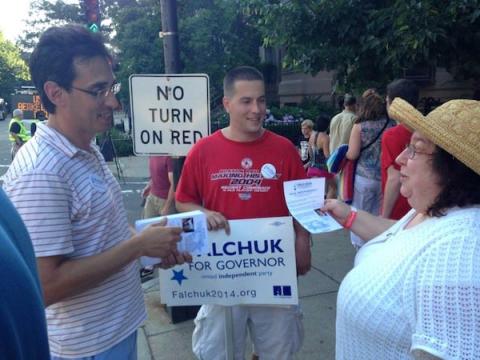Month 2, July 2013
In my campaign for Governor of Massachusetts, it’s been interesting to learn how many people think voters in our state are almost all Democrats. They’re nearly always surprised to learn that, in fact, a majority – almost 53 percent of voters – are “unenrolled” – independent voters who choose not to be tied to either Democrats or Republicans.
As IVN reported last month, Massachusetts leads the pack nationwide of states with the highest percentage of independent voters. I can tell you from meeting thousands of them, these voters are hungry to be involved in the political decisions that affect their lives. They just feel alienated by a political process that seems disconnected, distant, and focused on priorities that are out of step with the majority of voters.The symptoms of that disconnect are clear. Despite our 53 percent of independent voters, we have not one single independent lawmaker in the Massachusetts House, Senate, Governor’s office or cabinet. Compounding this dynamic, a staggering 63 percent of our State House seats were unopposed during the 2012 election.
It’s fair to say there are some voters who understandably believe the two-party system in Massachusetts, as in many states, has become so ingrained as to make it impossible to change – leaving us with the dispiriting “I always vote for the lesser of two evils” voting mentality.
But, I can report a completely different dynamic happening out there. There is a growing call for independents, one that I and my many volunteers of all political stripes see each day gaining in momentum and certainty. When meeting and talking with literally thousands of voters in cities and towns throughout our state this summer, we are hearing a loud and clear call for more independents. Even I have been surprised by its consistency:
“We need a lot more independent thinking and more independents making the rules,” according to one voter in Hyannis.
“We need something different. We need to shake things up,” a Worcester voter told me.
“The two parties just aren’t paying attention to us anymore,” said another voter in Lowell.
A couple in Springfield remarked, “We should have more options – we’re a democracy, aren’t we? Where’s the balance?”
The most moving comments have come from voters who tell us, while we’ve been canvassing at summer festivals and gatherings in 97-degree weather, that they think we’re brave to try to bring about this kind of change. They’ll support me as Massachusetts’ first independent governor, according to one group of voters I met, “on general principles.”
Some voters my volunteers and I meet start out a little cynical, even ticked off, about politics in general, but I understand this. What I hear over and over again from good, hard-working people is a deeply held belief that we face serious problems, among them that our elected leaders are more focused on getting elected rather than addressing voters’ real priorities. There is a deep sense that sound bites have taken the place of real, genuine conversation and productive debate.
It can be disheartening to realize how widely shared these views are. But there’s a silver lining. If so many voters feel this way, and word about their discontent and genuine interest keeps spreading, doesn’t that growing awareness and demand for more substance make it possible to change the whole game board?
Instead of throwing fuel on the fire to upset voters even more – the way we often see so many politicians do to rile up their base – I sincerely believe we have a responsibility to listen to voters’ thoughts, views and opinions. This simply must take the place of treating voters as though they’re some sort of necessary evil, one to be humored and pandered to in the weeks leading up to elections.
Because in this thinking and clear, respectful communication lies the potential of something that can turn traditional notions of politics on their head in Massachusetts – just like in other states.
Changing our political climate and broadening our free democracy by welcoming independent solutions would be a healthy thing – not a threat. Indeed, progress is not possible without change.
If more states with growing numbers of independent voters elect pragmatic, sensible independent leaders to office, we can begin to actually craft innovative solutions to problems, rather than just kicking the can down the road to the next election. Through hard work, innovative ideas, and a more inclusive approach, so much progress becomes possible.
I can see this. I can see it happening.
And so can more and more voters.
Photo credit: Evan Falchuk / Facebook

